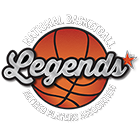As if on cue, Louis King Jr. of the G-League Westchester Knicks popped through the office door at the NBA Players Association and greeted NBPA Executive Vice President of Engagement and Development, Chrysa Chin: “Hey, Moms.”
Whether it is “Moms,” “Aunt of the NBA” or “Mama Chin,” there are many endearing terms when it comes to the woman who everyone reading this article probably already knows. When it comes to the NBA, she is everywhere! Mama Chin is a fixture in locker rooms, travels internationally to meet with BAL players in Africa, and has worked in the NBA league office.
“I have heard it all, guys always say to other players: ‘Talk to her but don’t call her Chrysa. That’s Momma Chin of the NBA.’” Chin’s background as a problem solver began at the New York City Human Resources Administration, where she was a caseworker in the 1980s. People who had fallen through society’s cracks and needed help were her specialty. Out of a cramped office in the Bronx, she worked with juvenile delinquents, the homeless and mental health patients whose needs she always tried to fulfill.
The Aunt of the League joined the NBA Players Association in 1991 under then union’s executive director Charles Grantham. He immediately recognized her as a problem solver extraordinaire and gave her the first big professional break of what has become a decorated career.









